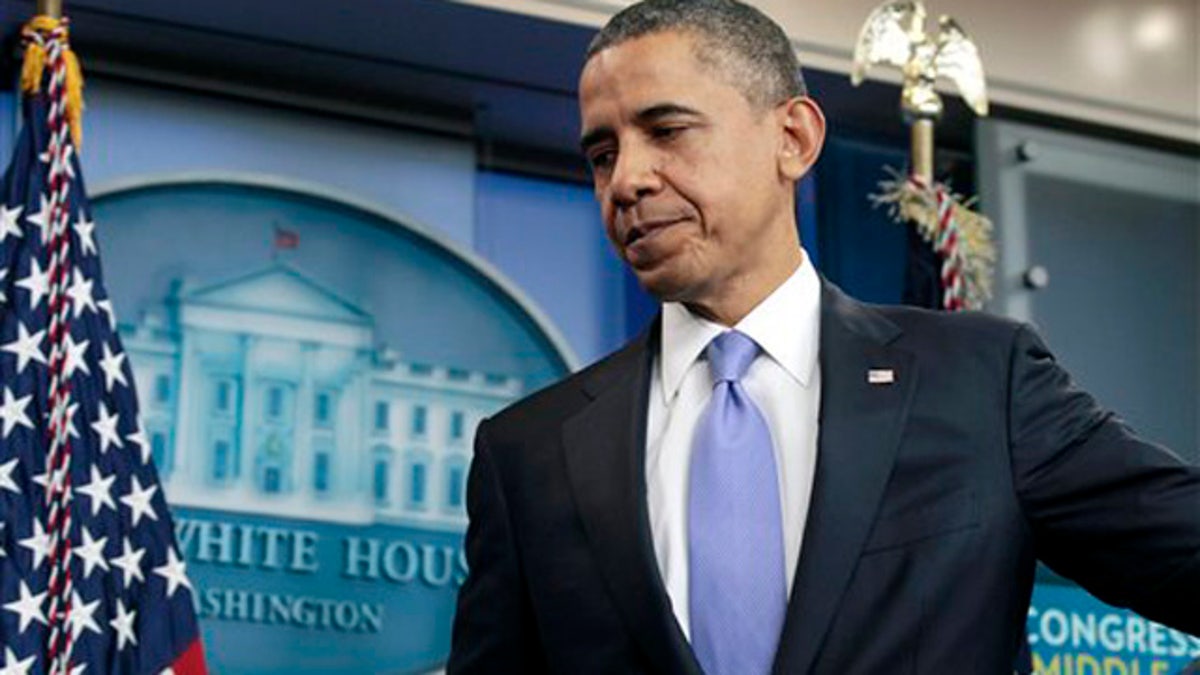
Dec. 8, 2011: President Obama leaves a news conference in the White House briefing room in Washington. (AP)
President Obama's political strategy for the start of the coming election year will focus on offering voters an unmistakable contrast between him and an unpopular Congress on issues like taxes, according to a top aide, as the president prepares to make a similar contrast with the eventual GOP presidential nominee.
Interestingly, the president will not be making an equally aggressive effort to promote his controversial health care law, now under review by the Supreme Court, and arguably the most significant domestic accomplishment of his first term.
Americans have already seen some of the efforts the president has made trying to portray himself as what a White House official calls "a warrior for the middle class." That messaging going forward will be concentrated on asking voters to make a choice between Obama and the Republican-led House of Representatives.
"We're going to be doubling down on our commitment and our message in terms of fighting for the middle class," Deputy Press Secretary Joshua Earnest told reporters covering the president's Hawaiian vacation.
It's a populist message Obama will try to carry out while also claiming to be an outsider.
"In terms of the president's relationship with Congress in 2012, the state of the debate, if you will, the president is no longer tied to Washington, D.C.," Earnest said.
In a briefing, Earnest offered a broad view of the president's agenda going into the new year. The focus -- continuing themes Obama has made in recent months including pitches for job-creating legislation that, according to the president's oft-repeated slogan, "we can't wait" to pass.
It's a tactic White House strategists think is a winning one. They feel the recent fight over the two-month extension of the payroll tax holiday also gives the president momentum going into 2012.
"So in terms of the public's conception of what's happening in Washington, D.C., you have an image of a gridlocked, dysfunctional Congress, and a president who's leaving no stone unturned to try to find solutions to the difficult financial challenges and economic challenges facing this country," Earnest said.
What was left out of the informal presentation to reporters was any mention of the upcoming Supreme Court litigation over the president's health care law, passed in 2010 and derisively called "Obamacare" by its critics. While Earnest cited polling data suggesting Americans are more favorably disposed to the president on tax policy, when it comes to health care law they are decidedly against the law. A string of Associated Press polls this year showed a steadily declining opinion of the controversial law. In January, it was an even split. Now, 49 percent of adults say they oppose the law while only 29 percent offer support.
"The health care law is unpopular, especially among swing voters," Democratic strategist and Fox News analyst Doug Schoen said. "So the White House wants to say as little as possible about it."
That isn't to say the president will avoid the issue. Just last month at a fundraiser in New York, Obama said, "in addition to preventing a financial meltdown and preventing a second Great Depression, we were able to pass a historic health care bill that's going to make sure that 30 million people have coverage." And several days ago Health and Human Services Secretary Kathleen Sebelius, who is in charge of implementing much of the law, put out an eight-part highlight package on the White House website.
When asked by a reporter about the presidency's advocacy of the health care law in 2012, Earnest said he figured the president would not shy away. But it's not clear if that support will be loudly articulated beyond small gatherings of core supporters, like the November fundraiser.
An obvious place for Obama to announce his full-throated support of the law and in front of a large audience is his State of the Union address on Jan. 24. He used that occasion in 2010 to blast the Supreme Court for its ruling in a campaign finance case and this past year used the speech before a joint session of Congress to defend his health care law. A senior White House official said it's too early to know whether the matter will be included in the upcoming speech.
What's also not clear is how much attention the president is paying to the behind-the-scenes work leading up to the March arguments at the court. The justices will hear four cases challenging various aspects of the law. Its most controversial provision requires every American to buy insurance or pay a penalty. Earlier this year, the 11th Circuit U.S. Court of Appeals in Atlanta said that mandate goes beyond the bounds of the Constitution.
The case's first key date in 2012 comes Friday when opening briefs are due at the high court. Those include one from the solicitor general explaining why the government thinks the 11th Circuit's ruling on the individual mandate needs to be overturned.
Historically, the solicitor general's office has operated with a degree of independence from the White House and even the rest of the Justice Department. "However, the solicitor general as a matter of courtesy may run drafts by the White House counsel and even the president," University of Richmond Law Professor Carl Tobias told Fox News.
Asked if the president has seen drafts of the brief, the White House official was unsure and a Justice Department official didn't respond to an email inquiry about the president's involvement.












































